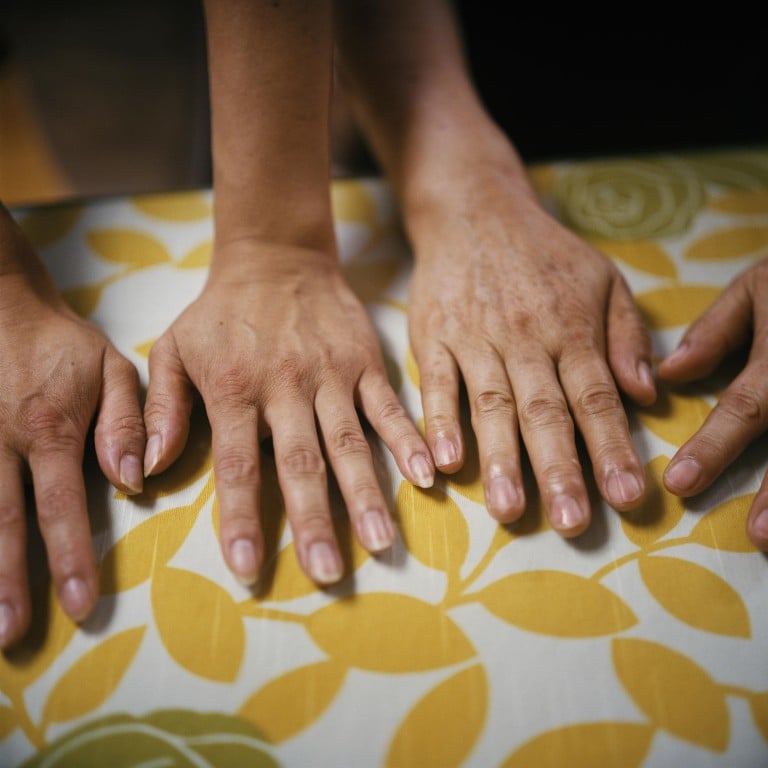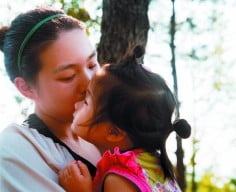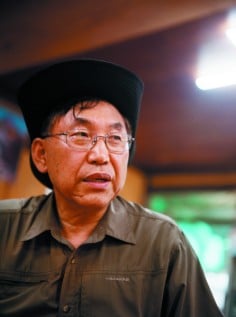
Broken bloodlines: a South Korean adoptee tells the mothers’ tales
Agnès Dherbeys returns to South Korea, from where she and many others were adopted, to meet some of those who were impelled to abandon their children
The South Korean economy is the 15th largest in the world. The little Asian country of 50 million people is also a member of the Organisation for Economic Co-operation and Development and the G20 group of major economies.
South Korea has not always been so economically strong, though, and its current status has been won through a lot of hard work and sacrifice. The Korean war (1950 to 1953) took a terrible toll on the country, as did the extreme poverty that followed. Those tough times have had a lasting effect on the many children who were put up for adoption by parents who couldn't afford to keep them.

I was one of them, and was later adopted by French parents.
A number of essays have been dedicated to the issue of adoption and to the challenges faced by South Korean children who were uprooted and forced to accept a new identity - but, to my knowledge, no one has yet given a voice to the birth mothers.
Over the course of last year, I met some of those mothers as part of my "Omone" (Korean for "mother") photography project, visiting my country of birth armed with revived childhood fantasies and a camera.
Over the months of talking with these women, a clearer picture slowly emerged of how Korea was 30 years ago. The circumstances they faced and the reasons for doing what they did paint a portrait of a harsh, poor and ultra-conservative society. South Korean children are still put up for adoption abroad, but 90 per cent of them now are born to single mothers. Those parents from an earlier time who had fewer choices, or none at all, are victims of massive and irrevocable trauma. They have for decades carried their burden - sorrow, regret and shame - with little or no support.
In their hearts, they remain mothers to their vanished offspring. Even if they see their children again it does not compensate for the lost years, nor assuage feelings of guilt. They remain destitute and deprived, facing the uncertainties of severed bloodlines.
Discovering the country of my origin through these troubling meetings, often in beautiful, peaceful places, confirmed that, in spite of the outward banality of international adoption, the act of abandonment remains an extraordinary event for all involved.
was never my intention. In some ways, I had already gone through my mourning.
Nevertheless, I was given the chance to visit my orphanage. A Sister Theresa got in touch after having seen me on television. She told me she used to work in the White Lily Orphanage, in Daegu, 235 kilometres southeast of Seoul, through which more than 11,000 orphans and abandoned children transited.
When I visit, in June, Sister Theresa shows me my admission sheet. On it is a date (December 17, 1976, the day I was born, apparently) and a name: Mrs Song, a midwife from Geoncheon, who brought me to the White Lily and named me Song Dong-hee. Mrs Song delivered 13 other babies to the orphanage, on the day they were born or the day after.
The file says I stayed at the White Lily until March 1977 (although my Holt International Children's Services records claim I left White Lily at 11 days old).
On her own initiative, Sister Theresa had gone to Geoncheon, 48 kilometres east of Daegu, even before we spoke on the phone, and found the house of the now-deceased Mrs Song.
She insists I should meet, immediately, some of the old women of the village. Her tenacity disturbs and confuses me. I really don't want to rush into this. I want to let this new information sink in - after all, it is not every day you find out your name comes from someone other than your birth parents, that you never actually went through a foster family in Seoul (as my Holt agency file suggests) and that you were born in a tiny village named Geoncheon …
"Oh well," I tell myself, letting her convince me, "let's stay in the energy of this crazy day."
I meet Lee Jung-ja, 71, the pharmacist in Geoncheon. She introduces us to a friend of the same age. They discuss, argue; they seem to be excited to help me, and to play investigator - "Come on, call everybody, the [adopted girl] is waiting." As I sit in Lee's living room, she and her friend begin making calls on their mobile phones. I am not ready; the situation is escaping from my control. I gather little from the women's discussions through my translator.
A woman calls back: she says she recently had a dream in which one of her ancestors told her she would soon have to have a DNA test even though she had not thought of her abandoned child for years. She wants to meet me. Everything is going way too fast; I don't even get the chance to ask the obvious questions: in what year was her daughter born? Was Mrs Song her midwife?
An appointment is fixed for two hours later. I tell myself, "God, this is not possible. I can't meet my mother just like that - so fast, so easily, with no preparation or hard facts checked!"
Before I know it I am facing my potential mother, Park Sook-ha, who seems suspicious and scared. She is staring at me - perhaps this is as much a shock for her as it is for me.
"I don't think it is her," translates Sister Theresa. This is the most confusing time I can recall of my entire life. Potential mother and potential child cornered, observing each other like wounded animals. We compare our nails, the shape of our ears. Because of the lack of a common language, there is so much we cannot say.
I feel ashamed to hope she isn't mine, this peasant who abandoned her child because she already had three daughters and wanted a boy. I meet her husband, a gorgeous old man. We check the family albums, the photos of their daughters, all older than I. She mentions the DNA test and gets excited. Her sudden enthusiasm is moving.
When we leave each other, we are alone again in our respective traumas. The wound of abandonment must have been reopened for her as much as it has been for me.
Back in the big city, back in the "normal", I feel totally astounded, deafened. I still do, writing these words - wondering what the DNA test will reveal.
from Sister Theresa. The test is negative. I think I am relieved.





Geoncheon, Mrs Park (the salt vendor, as they call her in the village), 79, did not want to talk to me at first. Eventually she offered, as mothers do, to take me for lunch. She opened up a little, but her memories were hard to express and it caused her obvious pain."After we got our 10th daughter, we really expected to have a son," she says. "But again, a girl came - the 11th. My husband took her and, without my consent, he took her to the midwife, Mrs Song."
"I have nothing to offer to my son now. I am just old and poor.''
Pyongtaek, Kim Ji-hee, 64, lives in a small apartment near a sprawling United States military base."I used to be a comfort woman [prostitute] for the US soldiers based in South Korea. Pregnant, I got married to a soldier who took me to Virginia [in the US]. Life was so dull and boring."I came back to Korea with my son. But here, the children were bad to him because he was of mixed blood. When he turned eight years old, he begged me to send him to the United States. I don't know why I didn't send him to his father. I went to see an adoption agency. I regret it."The pimps hammered us with drugs and alcohol. I have nothing to offer my son now. I am just old and poor."
"I can't stand not knowing what my little daughter has become."
Incheon, Shin Kyung-hee, 58, works in a restaurant. Her daughter was born Lee Sang-ha on July 28, 1975. She would have arrived in France in 1979."I got married really young," says Shin, her hands shaking on her tea cup. "My husband used to beat me up. While I was in hospital [she had broken her pelvis while trying to escape from him] he and his new girlfriend took my child and put her up for adoption. I have never forgotten her and I can't stand not knowing what my little daughter has become. I only know she was adopted in France. Please, help me to find her."

"I wondered if she was still alive - if she was well. I wanted to help her."
Seoul, Lee Man-woo, 59, works in the computer industry. A few years ago, he found his daughter, who had been adopted in Denmark."I often hear that the paternal instinct is not as strong as the maternal one. Honestly, as a father, it was hard to make the search for my daughter." Lee's daughter was born in 1979 with a badly malformed palate. Her parents, he says, were too poor to pay for corrective surgery."This type of handicap is viewed badly in Korea, and life would have been tough for her. Someone told me that the Seoul Metropolitan Children's Hospital did all necessary surgeries on orphans. So I left my daughter there, with a paper bearing her name, Lee Eun-kyeong, and her birth date. She was our first baby and I hadn't registered her."Almost 30 years later, Lee started searching for his daughter "to know if was still alive, and since my income had improved, I wanted to help her financially. She told me she went through 13 surgeries and now works as a web designer. She is married to a professor. I am happy for her and we talk sometimes by Skype."
